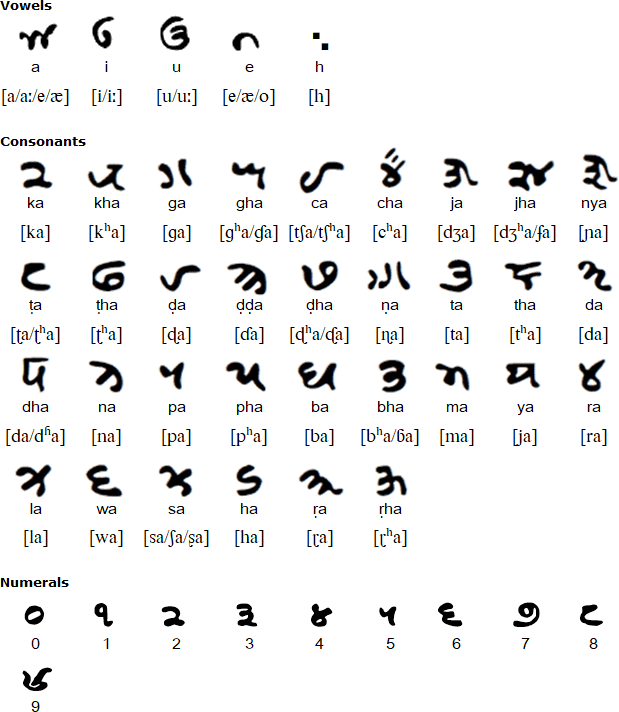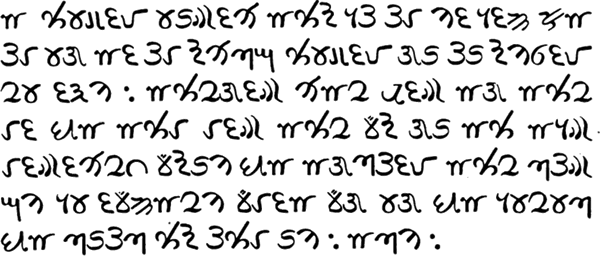The Multani script developed from the Landa script in the 18th century in the Multan region of Punjab and in northern Sindh in what is now Pakistan. It was used until the 20th century to write Saraiki, Sindhi, Punjabi and other languages spoken in that region. It was initially used for commercial activities. In the early 19th century it began to be used for literature as well. The first printed book in the Multani script was a translation of the New Testament published in 1819.
Multani is also known as Karikki or Sarai. In the second half of the 19th century the British administration introduced a version of the Perso-Arabic script to write Saraiki and other languages of Sindh. As a result, Multani fell out of use.

Download an alphabet chart for Multani (Excel) - uses the only Unicode font currently availble for Multani. The chart above uses images from this PDF.

Ai saragwitš rahaṇwala asda pita teḍa naw pawitra tha teḍa radž awa teḍa dilmaṭha saragwitš džaha taha dunyawatiš kara wangna. askadžiwaṇ layak khawuṇ adž asko dawa bhya asḍa ḍewiṇ asko tšuda džaha Asia apṇa ḍewaṇwaleki tśhuḍehun bhya adzmatwitś aala mataṇ ṭhana para watśhtriakani tśhuḍawatśhadž radž bhya parākaram bhya Mahatma sada such Sindh.Amen.
Source: http://gospelgo.com/a/saraiki.htm
Our Father which art in heaven, Hallowed be thy name. Thy kingdom come. Thy will be done in earth, as it is in heaven. Give us this day our daily bread. And forgive us our a debts, as we forgive our debtors.And lead us not into temptation, d but deliver us from evil: For thine is the kingdom, and the power, and the glory, for ever. Amen.
Details provided by Biswajit Mandal (biswajitmandal[dot]bm90[at]gmail[dot]com)
Information about Multani
https://en.wikipedia.org/wiki/Multani_script
https://www.unicode.org/L2/L2012/12316-multani.pdf
Ahom, Aima, Arleng, Badagu, Badlit, Basahan, Balinese, Balti-A, Balti-B, Batak, Baybayin, Bengali, Bhaiksuki, Bhujimol, Bilang-bilang, Bima, Blackfoot, Brahmi, Buhid, Burmese, Carrier, Chakma, Cham, Cree, Dehong Dai, Devanagari, Dham Lipi, Dhankari / Sirmauri, Ditema, Dives Akuru, Dogra, Ethiopic, Evēla Akuru, Fox, Fraser, Gond, Goykanadi, Grantha, Gujarati, Gunjala Gondi, Gupta, Gurmukhi, Halbi Lipi, Hanifi, Hanuno'o, Hočąk, Ibalnan, Incung, Inuktitut, Jaunsari Takri, Javanese, Kaithi, Kadamba, Kamarupi, Kannada, Kawi, Kharosthi, Khema, Khe Prih, Khmer, Khojki, Khudabadi, Kirat Rai, Kōchi, Kodava Lipi, Komering, Kulitan, Kurukh Banna, Lampung, Lanna, Lao, Lepcha, Limbu, Lontara/Makasar, Lota Ende, Magar Akkha, Mahajani, Malayalam, Meitei (Modern), Manpuri (Old), Marchen, Meetei Yelhou Mayek, Meroïtic, Masarm Gondi, Modi, Mon, Mongolian Horizontal Square Script, Multani, Nandinagari, Newa, New Tai Lue, Ojibwe, Odia, Ogan, Pahawh Hmong, Pallava, Phags-pa, Purva Licchavi, Qiang / Rma, Ranjana, Rejang (Kaganga), Sasak, Savara, Satera Jontal, Shan, Sharda, Sheek Bakrii Saphaloo, Siddham, Sinhala, Sorang Sompeng, Sourashtra, Soyombo, Sukhothai, Sundanese, Syloti Nagri, Tagbanwa, Tai Noi, Takri, Tamil, Tanchangya (Ka-Pat), Tani, Thaana, Telugu, Thai, Tibetan, Tigalari, Tikamuli, Tocharian, Tolong Siki, Vatteluttu, Warang Citi
Page last modified: 16.03.23
[top]
You can support this site by Buying Me A Coffee, and if you like what you see on this page, you can use the buttons below to share it with people you know.

If you like this site and find it useful, you can support it by making a donation via PayPal or Patreon, or by contributing in other ways. Omniglot is how I make my living.
Note: all links on this site to Amazon.com, Amazon.co.uk
and Amazon.fr
are affiliate links. This means I earn a commission if you click on any of them and buy something. So by clicking on these links you can help to support this site.
[top]